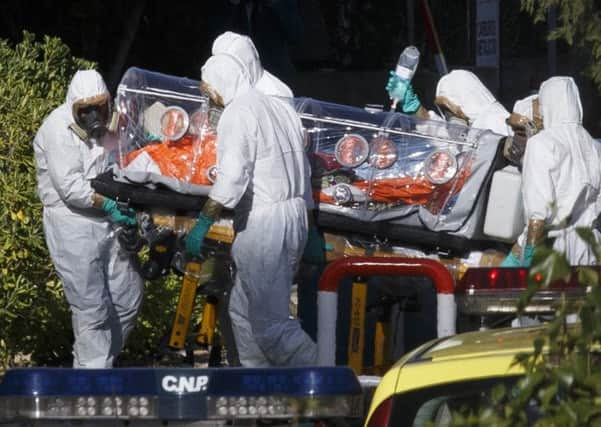Infected priest is first Ebola case in Europe


Yesterday saw the first patient known to be infected with the virus arrive on European soil. Spanish priest Miguel Pajares, 75, had been helping people with the disease in Liberia, was transferred to a Madrid hospital.
He was one of three who tested positive at the San Jose de Monrovia Hospital in Liberia earlier this week.
Advertisement
Hide AdAdvertisement
Hide AdJuliana Bohi, an Equatorial Guinean nun with Spanish nationality who worked with him, was also brought back but she is not infected. Both worked for the San Juan de Dios hospital order, a Catholic humanitarian group that runs hospitals around the world.
Mr Pajares and Ms Bohi are being kept in isolation at the Carlos III centre, which is run by La Paz hospital.
President Obama’s administration last night announced that it was forming a special Ebola working group of scientists and health officials to consider setting policy for the potential use of experimental drugs to help the hundreds infected by the virus.
Britain is to contribute more funds to help countries affected by outbreak of the deadly virus after a government emergencies committee met to discuss how to limit the spread of infection.
The government had already pledged £2 million to help efforts in Sierra Leone and Liberia but has now increased its assistance package to £5m, International Development Secretary Justine Greening said.
Meanwhile, Foreign Secretary Philip Hammond chaired a meeting of the government’s Cobra emergencies committee to discuss the situation in West Africa.
So far, more than 1,700 people have been infected in Sierra Leone, Liberia and Guinea, and a handful of probable cases have been identified in Nigeria. A total of 932 people have died during the outbreak, latest figures from the World Health Organisation (WHO) show.
The army blockaded rural areas hit by Ebola in Sierra Leone yesterday, a senior officer said, after neighbouring Liberia declared a state of emergency to tackle the worst outbreak of the disease.
Advertisement
Hide AdAdvertisement
Hide AdWorried Liberians queued at banks and stocked up on food in markets in the capital Monrovia, while others took buses to unaffected parts of the West African country after president Ellen Johnson Sirleaf announced emergency powers lasting for 90 days late on Wednesday.
The state of emergency allows Liberia’s government to curtail civil rights and to deploy troops and police to impose quarantines on badly affected communities to try to contain an epidemic that has struck four west African nations.
In Sierra Leone, president Ernest Bai Koroma has said all Ebola victims must now be buried near where they died to minimise exposure while transporting highly contagious corpses.
WHO spokesman Gregory Hartl said: “This outbreak, because of its size and its geographical extent, certainly merits an extraordinary response and we know countries have announced they must take extraordinary measures, so that is understandable from a public health perspective.”
Liberian information minister Lewis Brown vowed there would be stringent surveillance at the country’s international airport where many flights have been cancelled because of the outbreak.
“We are facing a threat of the greatest proportion,” he said. “No one, absolutely no one, will be allowed to enter or leave our country with a temperature above normal.”
The unprecedented measures came after a man with Ebola in Liberia boarded a flight and ended up in Nigeria, where a nurse who treated him is now dead from the disease and several others are infected. The traveller also died.
Experts warned that extreme measures risk driving patients and their families further underground out of fear.
Advertisement
Hide AdAdvertisement
Hide AdThe best way to track possible exposures is through community leaders who are known and respected, they say.
“Nothing replaces that sense of community trust,” said Dr David Heymann, professor at London School of Hygiene and Tropical Medicine. “So if you come in with brute force, things might appear to be working but it could be pushing people out where they can’t control the borders and the disease gets out.”